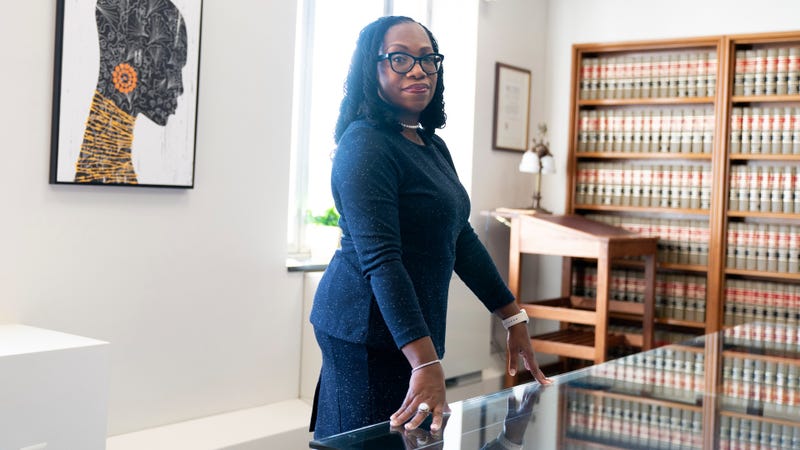
PHILADELPHIA (KYW Newsradio) — U.S. Supreme Court confirmation hearings for federal appeals court Judge Ketanji Brown Jackson begin on March 21. If confirmed, President Joe Biden's nominee would be the first Black woman ever to serve on the highest court in the land — a court that once declared her race unworthy of citizenship and endorsed American segregation.
What should the American public know about Jackson before the hearings start? What are the highlights of her career? Lisa Tucker, associate professor of law at Drexel University’s Thomas R. Kline School of Law joined KYW Newsradio In Depth to talk about Jackson and what to expect from the confirmation process.
Listen to that conversation here:

Tucker says she met Jackson in law school, and the pair have been close friends for more than a decade. She says the historic nominee, who was born in Washington, D.C., and grew up in Miami, is very down to earth.
"She went to public schools. Her parents [Johnny and Ellery Brown] were involved in the public school system. Her mom was a principal. Her dad was the attorney for the public school district," Tucker said.
Jackson traces her interest in the law to when she was in preschool and her father was in law school and they would sit together at the dining room table, she with coloring books and he with law books.
She went on to graduate from Harvard University — "even though her college counselor told her, 'Yeah, maybe you should aim a little bit lower,'" Tucker said — and then on to Harvard Law School.
"Since then, she's just had a variety of very important and well regarded positions, both in the public and the private sector," Tucker said.
"I think what we're seeing is somebody who can really relate a lot to American people, and who has a lot of lived experience. And of course, the lived experience that no one before her has had, and that is of a Black woman growing up in America."
Jackson has said that her parents chose her name to express their pride in her family's African ancestry. They asked an aunt who was in the Peace Corps in Africa at the time to send a list of African girls' names, and they picked Ketanji Onyika, which they were told meant "lovely one."
By nominating Jackson, Biden is fulfilling a campaign promise and further diversifying a court that was made up entirely of white men for almost two centuries. Next to Clarence Thomas, Jackson would be the current court's second Black member — and just the third in its history. She would be only the sixth woman to serve on the court.
If confirmed, she would also be the first former public defender on the high court.
"So she really sees things on both sides of a lot of issues, for example, criminal law," Tucker said. "And the Fraternal Order of Police actually endorsed her, which is a very, very big deal for someone who's been a public defender."
Democrats hoping for a quick confirmation
Jackson was nominated by Biden in 2021 to serve on the U.S. Court of Appeals for the District of Columbia Circuit and confirmed by the Senate last June. She previously sat on the D.C. district court, nominated by former President Barack Obama and confirmed in 2013. She worked as a law clerk for Breyer early in her career and served on the U.S. Sentencing Commission, the agency that develops federal sentencing policy.
As an appeals court judge, she was part of a three-judge panel that ruled in December against Trump's effort to shield documents from the House committee investigating the Jan. 6, 2021, insurrection at the U.S. Capitol.
She would replace liberal Justice Stephen Breyer when he retires at the end of the term this summer, so the court's 6-3 conservative majority will not change. Democrats want to confirm Jackson by April 8, when the Senate is scheduled to leave Washington for a two-week spring recess, before Breyer leaves the court to ensure that she is ready in waiting.
That may be asking a lot, but Biden made the process easier by picking Jackson, who was already vetted by the Senate Judiciary Committee last year when Biden nominated her for her current job. Senate Majority Leader Chuck Schumer said that, after the Judiciary Committee votes on the nomination, the Senate will move immediately to confirm her.
The last three Supreme Court confirmations, all nominees chosen by then-President Donald Trump, were intense partisan battles that deeply divided the Senate. Democrats say they want to bring down the temperature and confirm Jackson with votes from both Republicans and Democrats. But it's unclear if they will be able to do that.
Listen to the full conversation with Lisa Tucker here:



